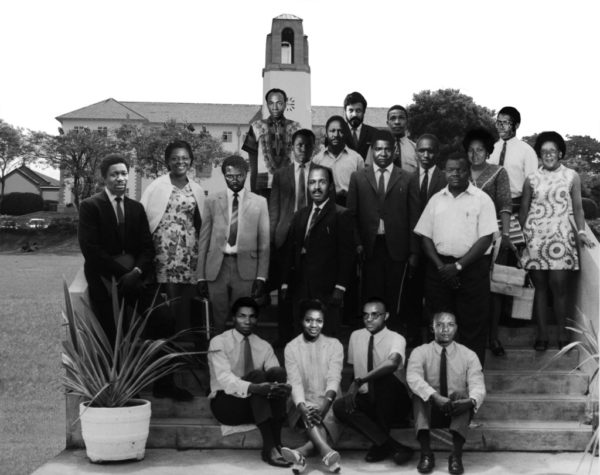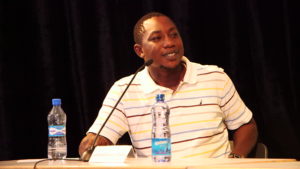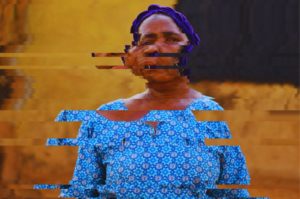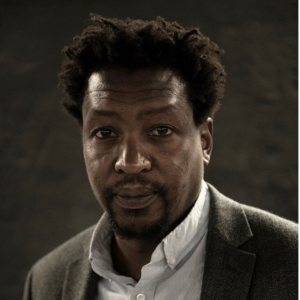
Richard Oduor Oduku, Jalada Africa co-founder and Brittle Paper Award for Essays finalist, writes about his visit to London, in October of last year, to attend the “SOAS African Literatures Conference – 55 Years After the First Makerere African Writers Conference.”
*
I pay Taxify charges and lug my bag to Java House. The airport is relatively deserted. It is more than five hours to departure time. Too early to be here but it is an election day and precaution shouted that I should report before the polling stations closed at 5 PM, to check in early and wait. We while away the hours of uncertain happiness with a mug of coffee to fill the silent interludes in our conversations. Sometimes, our laughter, tinged with fear, bubble and drown the election proceedings on the television screens, but most times we are subdued, relishing only the ability of comfort food to blunt the pain of goodbyes.
I planned these travels way before the announcement of the elections date. Still, to be at Jomo Kenyatta International Airport today, to leave one’s family under a cloud of uncertainty, is the least courageous choice a man can make. It haunts as one gives the last hugs to lovers, as one checks in, as one walks past the boarding gates—passport and boarding pass in hand, as one situates bottom on a seat by the window, as one ascends in pursuit of other dreams. Life is arriving and leaving, arriving and leaving, and the joys and pains associated with these transitions.
Heathrow, like all airports, reduce man’s understanding of the world to following a set of instructions: see, hear, and follow fast enough, or get lost and earn a traveler’s nightmare—a missed flight. It is at airports, whether JKIA, Dubai, or Heathrow, that one notices the growing opulence of China. Chinese travelers are everywhere. I presume countries whose citizens travel more, during peace times, indicate growing fortunes at home. I also presume that countries ravaged by instability, civil strife, or economic mismanagement also expel their citizens through these same airports, at least the blessed citizens, while the unblessed battle the trafficking routes in the Sahara desert and the tumultuous waves of the Mediterranean. Two poles apart. These paradoxes and the elections back at home occupy my mind as I digitally leaf through hilife entertainment, which isn’t half as impressive ice where you can oscillate from De La Soul’s 3 Feet High and Rising and a Tribe Called Quest’s Low End Theory, and still check out what Thundercat’s Drunk is all about, or check whether your bootlegged 4:44 and How to Pimp a Butterfly sound like the originals.
I took the Heathrow Express to Paddington, which was a little too expensive for my pockets, at £25. I should have taken the Piccadilly or Victoria line, the one I had taken when I was last here, to Euston Station – Kings Cross, but the reminder came too many days late, in the middle of a conversation with Zaahida Nabagereka, of Africult, and I had to assess the loss, internally, momentarily. I’m yet to outgrow the habit of mentally converting the pounds to shillings and mourning my downgrade from a position of Nairobi wealth to London penury. I’m convinced other foreigners do this mental conversion too, which makes our collective losses and downgrades easier to bear.
At Paddington, I changed to Euston line and alighted at Euston Square, from where I located my hotel, Taviston, just two hours after landing at Heathrow. As is the spirit of London, the streets are demure and measured, lined with architectural masterpieces, a mix of the bravery and wisdom of the ancients and the senescence of old age. Yet within these old bodies are hot sinuous veins—the meshwork of trains moving millions from home to work, from work to home, an eternal mobility and dreariness that isolates humans, turning them into mere factors of production. The trains mutter efficiency mantras beneath their breaths.
In intermodal hubs, the waiting masses retreat further into themselves. Asking for direction from Euston Square to your hotel means pulling a Londoner from the depths of preservation, away from the answers of an efficient transport system, and forcing them to think of journeys as if one was lost in the forest. You can see the look of confusion on their faces, and for the many who do not bother to give you an answer, it is perhaps not a coldness borne of spite, but the fear of uncertainty. What is left, for the lost traveler, is to hunt for Free Wi-Fi and talk to Google Maps. The worst that can happen to you is loss of time. If one is patient enough, and the Internet fast enough, Google has all the answers to a city’s navigation headaches. You will get your ticket, thanks to genial ticketing assistants, and join the throng stumbling into crowding trains. With time you will learn how practiced haste saves many from the inconvenience of thinking about personal problems—submerged but not entirely invisible. Once in a while, you will stumble on screaming torments behind bright faces—and you have to keep going, because in bustling cities, you cannot stop, or the black wings of the economy will begin slapping your face.
The perfect traveler’s scenario is having no baggage to tow and unlimited internet connection. Unfortunately, perfection is a shifting goal. I got lost on many of the underground trains while on my way to Alexandra Palace when I first came to this city. Roselyn has the whole story which she is forbidden to ever tell, but today, I tell myself that I’m becoming better at this traveling thing, as I rub fingers desensitized by a 9°C.
At the hotel’s reception, my name, Oduor, had been misspelled as Odour. I catch no feelings at all. This will be my home for three days. In the lift to my room, I amuse myself with the thought that if our political leaders used the trains and buses to navigate their ways when they come here for shopping and fanfare disguised as bilateral trade conferences, as opposed to being chauffeured from the airport to their hotels, in their many travels to world’s biggest cities, they would have learnt a thing or two about functionally efficient modern transport systems. I have lived in Nairobi for decades and endured its chaos. One could trade the rebelliousness of Nairobi’s matatus for this cold efficiency. I have in most occasions, in these trains, visualized a model for rapid bus transit system or light rail interlocking with a train service connecting Kenya’s major cities and towns. I wrote a note on this, on the phone, many months earlier, while on a train from Victoria Station to Gatwick Airport. I will talk to the President about this when I become big fish.
The next day, I walked with Sophie Abal, of Deyu African, to SOAS, University of London, where we had been invited together with others, thanks to Angelica Baschiera, to present at the SOAS African Literatures Conference, a reflection of developments 55 years after the first Makerere African Writers Conference. It was going to be a long day of presentations at the Brunei Gallery Lecture Theatre. All the big names were in attendance. Nobel Prize for Literature Laureate Professor Wole Soyinka was present. Ivor Agyeman-Duah, Co-Director of the 55th Memorial of the Makerere Conference and Visiting Professor and Director of the Woye Soyinka Foundation at the University of Johannesburg, was present. Dr Mpalive-Hangson Msiska, from Malawi, whose main research interests are Wole Soyinka and Chinua Achebe, and Dr James Gibbs, both graced the occasion. Also present were Mr Hassan Dahir Ismail, a poet and song writer, teaching Somali literature at the University of Hargeysa; Dr Ranka Primorac, lecturing at the Department of English, University of Southampton; Prof Atukwei Okai, Secretary-General of the Pan-African Writers’ Association (PAWA); and Dr. Sikhumbuzo Mngadi, from the Department of English at the University of Johannesburg. Dr Wangui wa Goro—translator, academic, critic, public intellectual, editor, writer, social and cultural catalyst, activist and campaigner for human and cultural rights for over three decades—was a central glue in the conference.
Nana Ayebia Clarke, the first African female Editor of the Heinemann African and Caribbean Writers Series at Heinemann Educational Books at Oxford for 12 years—the imprint that brought Chinua Achebe, Wole Soyinka, Ama Ata Aidoo, Ngugi wa Thiong’o, Buchi Emecheta, Nardine Gordimer, among others, to international readership—was right there in all her glory and verve. Ms Mary Ashun who won the 2008 African Canadian Women’s Achievement Award, was present. Ms Sefi Atta, author of Everything Good Will Come, Swallow, News from Home and A Bit of a Difference, blessed us with her presence.
From SOAS, Dr Chege Githiora—linguist, writer, and translator in Swahili, Gikuyu, English and Spanish—was present, as was Dr Martin Orwin who has a PhD in the phonology of Somali, has translated Somali poetry, and continues to work with a number of Somali poets including Gaariye and Hadraawi. Dr Alena Rettova is a reader of Swahili Literature and African Philosophy at SOAS, while Dr. Ida Hadjivayanis undertook a PhD in Norms of Swahili Translations and teaches Swahili at SOAS. Professor Mashood Baderin of Laws at SOAS and Louisa Uchum Egbunike, a graduate of SOAS, now teaching at City, University of London, were also present. With such a lineup of big writers, thinkers, and translators, it is easy to forget that I was also there—in flesh and blood—representing Jalada Africa: A Pan-African Writer’s Collective.
There were four main events scheduled for the day: two panels (“Reflecting on the Legacy of the 1962 Makerere Conference: African Literatures in the 21st Century” and “African Languages and Translations: Past and Present”), a book launch (The Gods Who Send Us Gifts: An Anthology of African Short Stories), tributes (to Buchi Emecheta, Abiola Irele, and Alain Richard), and poetry readings (Mr Hassan Dahir Ismail read Galiilyo/Catastrophe in Somali language, Dr Ida Hadjivayanis read “Niguse” by Alamin Mazrui, and Professor Atukwei Okai read his poem “The Bond-Oath of Ubuntu”).
Wole Soyinka delivered a keynote address, reflecting on some of the ideas that grew from the conference in 1962, particularly negritude and its contradictions. In the Languages and Translations segment, where I was, Dr Wangui wa Goro made a presentation on “Translating African Futures: Lessons from Past and Present”; I made a presentation on “Possibilities of Literary Translations in the Digital Age,” focusing on the Jalada Languages and Translations Project; Sophie Alal presented “Reclaiming Tongues”; and Dr Martin Orwin and Mr Hassan Dahir Ismail focused on “Form and Feeling in Translating Somali Poetry.” I’m reliably informed that these papers would be put together into a booklet, printed in-house at SOAS, and accessible to literature enthusiasts, in time.
I have recently become acutely aware of the value of naming names, of recognizing presence, and even though describing the particulars of each and every presentation is beyond the scope of this little babble, many of the ideas that embattled the 1962 conference are still present today. Among them are the contradictions around the CIA funding of many of the conferences and publications that defined post-independence publishing in Africa. Wole Soyinka commented that they did not know the CIA was the source of funds for the 1962 conference, but joked that had they known, they would have eaten that money properly.
The irony of the reflection of the Makerere Conference being held in London with funding from British institutions was also not lost on me. Even today, most successful literary and art projects in the continent are wholly or partially supported by donor funding. The result, in some cases, is skewed priorities, and a contractual obligation to produce culture that, in some cases, advances the funder’s interests which may be at a variance with the interests of the society where the arts and literatures are being produced.
The conversation on strategies for creating sustainable cultural organizations in Africa is an urgent one but it should not suffer from the weight of thousands of opinions and books that regurgitate colonial and neocolonial premises of why things are the way they are. Hundreds of hours in literary and art conferences are consumed by such discourses, and while they are rich and necessary in mapping the histories of change, in an environment where the cry for new/other possibilities is searing, they should instead nudge us to imagine how things that must be done can be done differently. In the absence of a deliberate approach to link the discourses with practice, they simply become a matrix of self-reinforcing, self-imprisoning narratives—an echo chamber.
There is a greater risk of being imprisoned by the past and the present and of forgetting to actively participate in imagining the diverse futures Africans desire to inhabit. The future desires new models of cultural production that can sustainably progress with zero, little, or moderate donor support as opposed to full dependency. The future desires national, regional, and global collaborations and partnerships characterized by equality, respect, understanding, and clarity of expectations.
Conversations should also focus on the structure of the arts and literatures market in Africa today, how it can be influenced to change, and the sources of alternative funding for cultural work to ensure sustainability. We need national and private funds in African countries, African endowment funds, corporate social responsibility by African corporations, and African philanthropists, among others, to support the work of creating the software, the culture, on which a society runs.
I share these, and other thoughts, with Zaahida, as we take tea, in a hotel opposite London Review Bookshop in Bloomsbury, before she drops me at the British National Museum, to reconnect with the mummies of my Egyptian ancestors, to fill the thousands of years gap between ancient African civilizations then and now, and to mull over these abducted histories that found life in strange lands and not among the people who look and live like them. The hotel is a modest establishment with personalized service, like many of this city’s eating and drinking places. They reek of the realization that ostentation shouldn’t be flaunted.
Eating and drinking places in Nairobi’s CBD are boastful, loud and flashy. The American obsession with excesses has become Nairobi’s identity. Not in London. Still there are certain idiosyncrasies that cities share. When I was here for the Africa Writes Festival 2017, on a day of touring the many sides of the city, I found myself in Wood Green, seated in Kantin—a small restaurant playing American RnB on the stereo. While waiting for their Kantin Special—egg, 2 bacon, sausage, tomato, beans, mushroom, and black pudding, all for £6.90—I raced my hands under the table and encountered a sticky gum, just like I had encountered before in a beer parlour in Kampala, a bustling tea kiosk on Tom Mboya Street, or the many other eating and drinking places. At least sticking chewing gum under tables is a shared global culture.
I’m writing a draft that would become this essay in Cyber Café, just adjacent Gate 19 at London Victoria Coach Station. I’m browsing “Kenyan repeat election” and eating a big chicken thigh, much bigger than anything you will find in Nairobi, and only comparable to the gargantuan chicken thighs in Goma, Congo. I’m thinking GMOs and antibiotics as the crushed chicken thigh slides down my throat. Who knew mzungu chicken thighs could be so big and juicy? Goma convinced me that such juiciness could only be found in Africa. One day I’ll go back to Congo just to see the size of the chicken that produces the kind of bigger-than-your-hunger chicken thighs we were served in Goma during the inaugural Jalada Mobile Literary & Arts Festival held at Yole! Africa. Gate 19 opens and I climb into Megabus, send a text home, and fall asleep as the bus cuts the night to Edinburgh, Scotland.
About the Author:
 Richard Oduor Oduku is a post-cynical humanist, a researcher, writer, editor and poet. He studied Biomedical Science and Technology and works as a Research Consultant, in Nairobi. He has been published widely and was longlisted for the 2015 BSFA Awards, and shortlisted for the 2017 Brunel International African Poetry Prize. He is a Founding Member of Jalada Africa, is Program Manager for the Trust, and was the Festival Coordinator for the 2017 Jalada Mobile Festival. He is a Board Member of Youth on the Move (NGO, Kenya), and Nonfiction Editor at Panorama – The Journal for Intelligent Travel, among others.
Richard Oduor Oduku is a post-cynical humanist, a researcher, writer, editor and poet. He studied Biomedical Science and Technology and works as a Research Consultant, in Nairobi. He has been published widely and was longlisted for the 2015 BSFA Awards, and shortlisted for the 2017 Brunel International African Poetry Prize. He is a Founding Member of Jalada Africa, is Program Manager for the Trust, and was the Festival Coordinator for the 2017 Jalada Mobile Festival. He is a Board Member of Youth on the Move (NGO, Kenya), and Nonfiction Editor at Panorama – The Journal for Intelligent Travel, among others.









Spotlight: Richard Oduor – Jalada Africa August 06, 2020 09:25
[…] Richard was shortlisted for the British Science Fiction Association (BSFA) Awards (2015), Brunel International African Poetry Prize (2017), Brittle Paper Award for Essays/Think Pieces (2017) and Brittle Paper Anniversary Award (2018), for “An African in London and Other Reflections on African Literatures“. […]